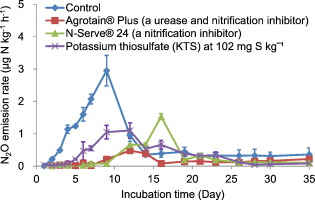Science of the Total Environment ( IF 8.2 ) Pub Date : 2017-11-10 , DOI: 10.1016/j.scitotenv.2017.10.274 Zejiang Cai , Suduan Gao , Minggang Xu , Bradley D. Hanson

|
Potassium thiosulfate (KTS, K2S2O3) has been shown to function as a nitrification inhibitor, thus has the potential to reduce nitrous oxide (N2O) emissions and play an important role in effective N management. The objective of this research was to determine the potential effects of KTS on N2O emissions and N transformation processes in comparison with commercial N transformation inhibitors (stabilizers). A laboratory incubation experiment was conducted using urea and ammonium nitrate (UAN) applied at 150 mg N kg− 1 in a Hanford sandy loam soil (coarse-loamy, mixed, superactive, nonacid, thermic Typic Xerorthents). Treatments included three rates of KTS (26, 51, and 102 mg S2O32 −-S kg− 1), a urease and nitrification inhibitor (Agrotain® Plus), a nitrification inhibitor (N-Serve® 24), and an untreated control. Nitrous oxide emission, soil pH, and mineral N species were monitored for 35 days. Total N2O emissions were reduced significantly by all KTS treatments as a function of KTS rate. At 102 mg S2O32 −-S kg− 1, KTS reduced N2O emissions by 48% (0.18% of total inorganic N), which was statistically similar to the N-Serve® 24 treatment (60% reduction) although lower than Agrotain® Plus (78% reduction). The KTS resulted in significantly less unaccounted (total N) loss compared to the commercial inhibitors. If the N2O emissions reductions observed in this laboratory study are validated in the field, using KTS for this purpose can also provide a fertility benefit and may reduce total chemical inputs into agronomic systems. Future research needs to determine the effectiveness of thiosulfate for improving overall nutrient management while reducing N2O emissions under field conditions.
中文翻译:

评价硫代硫酸钾作为硝化抑制剂以减少一氧化二氮的排放
硫代硫酸钾(KTS,K 2 S 2 O 3)已被证明是一种硝化抑制剂,因此具有减少一氧化二氮(N 2 O)排放的潜力,并在有效的氮管理中起着重要的作用。这项研究的目的是确定与商业化的N转化抑制剂(稳定剂)相比,KTS对N 2 O排放和N转化过程的潜在影响。使用尿素和硝酸铵(UAN)以150 mg N kg -1的浓度在汉福德沙质壤土中(粗壤土,混合,超活性,非酸,热典型Tyer Xerorthents)进行了实验室培养实验。治疗包括三种KTS剂量(26、51和102 mg S2 O 3 2-- S kg -1),脲酶和硝化抑制剂(Agrotain®Plus),硝化抑制剂(N-Serve®24)和未经处理的对照。监测35天的一氧化二氮排放,土壤pH值和矿物质N种类。所有KTS处理均显着减少了总N 2 O排放量,这是KTS速率的函数。在102 mg S 2 O 3 2-- S kg − 1下,KTS还原N 2O排放量减少了48%(占总无机N的0.18%),与N-Serve®24处理(减少了60%)相比,在统计上相似,尽管低于Agrotain®Plus(减少了78%)。与商业抑制剂相比,KTS导致的未说明(总N)损失明显减少。如果在本实验室研究中观察到的N 2 O排放量减少量在现场得到验证,则为此目的使用KTS还可以提供肥沃性,并可以减少农用系统中的总化学物质投入。未来的研究需要确定硫代硫酸盐在改善整体养分管理同时减少田间条件下N 2 O排放的有效性。











































 京公网安备 11010802027423号
京公网安备 11010802027423号